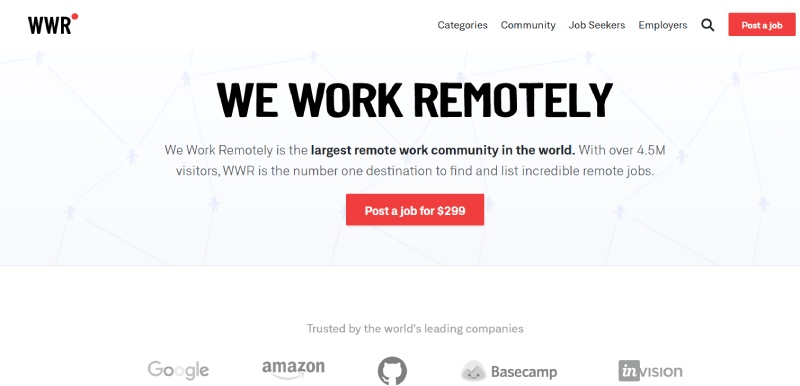Digital nomads are one of the most attractive working individuals in the global economy for the youth. The concept shows proof of how people can work and earn a substantial income while doing what they really want in life.
The digital nomad life is a big contra to the 9-5 office tradition that causes you to sacrifice your time, family, and leisure.
Let’s dig into life as a digital nomad.
What Does A Digital Nomad Do?
The term digital nomad first came into existence in 1997, in a book called The Digital Nomad.


The book explained the prophecy of a single invention, that is powerful, featureful, and so communicative, that employees will have the ability to work from anywhere, at any time they want- elimination of geographical immobility completely.
The all-powerful device that the book hypothesized turned out to be a laptop.
Digital nomads today, travel the world and work using a laptop. They don’t stick to a single office or residence, but carry their laptop with them, working at a different location every day.
One day on the beach, while the other at a coffeehouse in an entirely different city.
Digital nomads employ themselves in remote work, either contractually to businesses offering remote vacancies or are freelancers.
They carry around a laptop with them everywhere that gets their work done. Whenever and wherever they feel the need to work, they set up their station and get to work.
Once done, they continue on with their life.
Sounds like a daydream, doesn’t it?
Well, in the advanced technological era that we live in, significantly powered by electricity and wireless devices, becoming a digital nomad is as easy as applying for an office job.
What Jobs Can A Digital Nomad Do?
The huge wave of work-from-home standards in the past 2 years showed the world how effective and productive working remotely can be.

With that, it also showed that almost all jobs can be worked for remotely, not requiring an office space or a physically present team.
In many cases, working remotely actually proved to be more productive as employees felt more motivated to have more time for themselves after work.
Currently, digital nomads can be found working in the following industries:
- Accounting
- Customer Service
- Design
- Editing
- Healthcare
- IT
- Marketing
- Project Management
- Quality Analyst (QA)
- Recruiting & HR
- Sales
- Software Development
- Teacher/Tutor
- Transcription
- Virtual Assistant
- Writing
Essentially, any job that is done sitting in front of a PC at an office, can be done with a laptop being a digital nomad.
Seeing the list above, you can see that goes for almost all jobs that are common in workplaces. So being a digital nomad isn’t really something that unorthodox, it’s doing the same thing people do in an office, on a laptop at whatever place you want to be.
How Much Does It Pay To Be A Digital Nomad?
Being a digital nomad isn’t a job. The factor that decides how much you earn is the job that you choose.
Generally, since remote working is still a new concept to businesses, you may find yourself being paid less than an in-house employee.
However, there are thousands of cases where that’s not the truth.
Especially as a freelancer, many freelancers earn more than employed professionals.
A big reason for this is that the office lifestyle is famous for having significantly low productive hours. A significant amount of time from each employee is spent in gossiping, office politics, breaks, travel, and deliberate time-wasting.
On the other hand, working in your own comfort can have you solely focused on one thing. You can complete a task in 4 hours that may have required 8 at an office.
Another big reason is that being a digital nomad doesn’t restrict your potential. You have the time in the world, it only depends on how you manage to invest it.
With more productive hours and your own working hours, you can find the gateway to healthy and substantial earnings.
A general study showed that digital nomads make around $10-$30 an hour.
How Do Digital Nomads Find Work?
Digital nomads have two options to work remotely: freelancing or remote employment.
Both options have their own pros and cons.
Generally, freelancing would bring more freedom and control in your work while remote employment will help you with job security and contractual stability.
There are many companies that have started offering remote vacancies and have aided the growth of digital nomads, especially in the last couple of years.
Among the big names, there is Remote.co, We Work Remotely, and FlexJobs.

On the freelancing side of the work, the biggest names that provide freelancers with work are Upwork and Fiverr.
These are the station’s digital nomads who find their work.
At first, it is merely a trial period for most digital nomads to see if things can actually work well.
But as soon as they find themselves not needing to be at their home to work and can see stability in income, they set off on a travelling course, committing their lives to travel, leisure, exploring, and work in between.
Benefits Of Becoming A Digital Nomad
The biggest pro a digital nomad enjoys over an office-based employee is more freedom and control in their life.

Many people, like myself, feel that working in an office takes too much time of our life.
Let’s do the math.
On a typical day, you spend 8 hours a day sitting at a desk at the office.
At least 2 hours go into travel and personal grooming (shower, dressing up, etc.).
8 hours for healthy sleep.
That only leaves you with merely 6 hours to really do what you want.
In a more general sense, you spend 75% of your life just sitting in an office or laying in bed.
Your hobbies, your passions, your interests, your relationships. Do you really think 6 hours sound enough?
If not, you may have a digital nomad type of mindset.
Digital nomads put their own wants on top of their office life. Even if it poses risk, we would rather spend a life doing what we want
Time Shouldn’t Be About Money
As discussed above, many studies find remote employees to be more productive than office employees.
A Fortune study shows employees who enjoy control and flexibility show 29% more productivity than a fixed office employee.
Digital nomads tend to complete projects faster than an office employee would because at the end of the day, they see work as a necessity while their main focus is to get free as soon as possible to invest their time into doing what they really want for themselves.
Traveling, socializing, relationships, family, entertainment, learning a musical instrument, reading books, going to fancy cafes, discovering cultures, gaming…
Stuff that you’re passionate about and actively enjoy doing.
With more time, a digital nomad brings more freedom to their life.
More Control = More Happiness
A Microsoft study found out that more than 50% of their employees feel burned out (also phrased as productivity paranoia) at work!
This is mostly because employees find themselves obliged to go to an office, instead of actually wanting to.
And it is harder to deal with this when they are left with little to no me-time, at the end of the day, which could actually recharge or energize them.
A digital nomad, on the other hand, is more in control of their own life.
They work on their own terms, at the spot that they feel comfortable with, and have a plethora of me-time to enjoy.
Even if you hate working, a digital nomad can get through 6 hours of working at a comely beach that they have always wanted to visit, instead of in a white, dull, and stale office.
A popular Forbes study shows that digital nomads live happier life than office employees.
What Do Digital Nomads Miss Out On?
Being a digital nomad does sound like a heavenly life.
You travel, you work on your own terms, you get paid handsomely, and you have a lot of free time to spare.
And it’s not even difficult to be a digital nomad. Almost all jobs have the option to be worked remotely. You could quit yours and be a digital nomad today!
Then why is the digital nomad lifestyle still so unpopular?
That’s because, while, on paper, the digital nomad lifestyle does seem lavish, there is a lot that they miss out on.
No Office No Hustle
Digital nomads miss out on the good aspects of office life and mostly seem to compromise themselves in the big picture.
Offices do seem stressful and hectic when you’ve tied around to a 9-5 routine to them. However, working without an office has its own challenges.
An office has everything you need.
They have minimal distractions to help you focus better, and your colleagues are present around you preventing any communication delays, an office setting is helpful for working motivation, and an office has a fixed routine.
Digital nomads might be travelling and enjoying life on the surface, but without an office or colleagues around, they may lose themselves in the present without putting much focus on the long run.
An office life not only promotes growth and opportunities in your career but also provides stability to ensure growth.
Digital nomads may be earning more than office employees, but an employee will almost always have less of a risk to lose their source of income.
No Place To Call Home
An office employee lives a quarter of their day at an office, while the other two-thirds at their home.
And arguably, a place that you can call home is more important than anything.
Since digital nomads are always travelling, they don’t really have a single place to call home.
Sure, at first, it does seem fun to stay in different motels and places, but at the end of the day, you don’t have a place that is yours.
Without a home, digital nomads also miss out greatly on long-term relationships.
Dating, entertaining family, and socializing with friends are extremely challenging without a home.
Summarized Pros And Cons Of Being A Digital Nomad
It’s not all bad though.
Everything has its pros and cons. Being a digital nomad may sound boring to one person while it could be a passionate dream for the other.
The biggest aspects in life, as mentioned above, that a digital nomad misses out on is an office life and their own home.
If you don’t consider those things as important for you, or you feel like the pros outweigh the cons, don’t hold yourself back and be a digital nomad!
To help you make a rational decision, here is a good pros and cons list of being a digital nomad.
| Pros of becoming a Digital Nomad | Cons of becoming a Digital Nomad |
| You’ll be more productive in your working hours | Flexibility may make you feel less focused on work, and you may become prone to earning less, living paycheck to paycheck. |
| Personal time can significantly help you be more creative, potentially sewing the roots for breakthroughs! | Travelling is exciting. More control over your own happiness can lead you to impulsive spending. This can cause a dent in your savings or long-term goals. |
| Traveling means more experiences and socializing in life. | You are prone to feel homesick, at the end of the day. |
| More time to do what you really want- your passions, interests, and hobbies. | More friends than ever, but all of it ends up temporary since you don’t stick to one place. |
| More flexibility. Many remote jobs give you complete control for your working hours. | With temporary friendships, you are less likely to make meaningful relationships. This could lead to loneliness and depression. |
| No office politics or BS. | You will need to work A LOT on self-independence and choosing a healthy work-life ratio. |
| Statistically, more likely to be content on your deathbed (a better overall life). | |
| More time for yourself can help you figure out yourself, leading you to a much happier and stress-free life. | |
| More likely to cross all items on your bucket list! |
What Happens To Digital Nomads In The Long Run?
Ever wondered why you have only seen young digital nomads, but hardly find any middle-aged or old people as digital nomads?
You may think that is because the idea of a digital nomad lifestyle is relatively new, and only new technology has really made the lifestyle accessible practically.
Even 10 years back, wireless connections weren’t strong enough to support a digital nomad life. And it was only a couple of years back when businesses actually realized how productive and efficient remote work is, that they actually started working with digital nomads.
However, there is another reason for it.
The digital nomad lifestyle does die down in the long run, apparently at least.
But, that doesn’t mean they lose in the long run.
Retired digital nomads turn out to have a better life than most adult or old individuals who spent their lives employed in an office.
Essentially, being a digital nomad opens you up to new and innovative experiences in your life. You travel to hundreds of places, meet thousands of people, and you have a significant amount of your own personal time to figure yourself out.
After some time, some digital nomads find themselves not as excited about change. To go to a newer place or meet a new person.
At the end of the day, digital nomads tend to want to settle down.
However, since they spent their life exploring work, themselves, their interests, people, and places, they settle down for the best life possible!
Finding A Great Workplace To Settle
After working for thousands of clients and businesses, digital nomads make better decisions in choosing their future work life.
All of that makes up for a great profile, helping digital nomads secure highly rewarding roles.
10 years of being a digital nomad will help you achieve a much better resume than a 10-year-old office employee.
Even for an office, digital nomads are very much more likely to settle for a major role with a healthy working environment.
All of that sums up for a happy working life in the future, where you fill in an important role in an organization, get paid handsomely, and feel happy in the working environment.
Building A Home
All those years traveling from one place to another may have had you feel homesick, but you’re in a much stronger and more knowledgeable position right now to settle in somewhere that is right!
Traveling to hundreds of places gives digital nomads a good idea of how living conditions are in different countries and cities.
Once you’re willing to settle, you can now make a rational decision to settle somewhere you’ve already had amazing times at.
Digital nomads spend their life adapting to different places, so settling in a new environment doesn’t pose many challenges.
And if chosen right, you can live in a place that helps you financially.
All the travel gives you a good idea of how currencies and different economies work. Now that you’re settling in, and willing to own assets, you would want to invest in a place you already know has the lowest risks.
Starting A Family
Lastly, with the thousands of people you have interacted with, digital nomads find themselves more mature in choosing relationships or partners.
The exposure helps you significantly with social skills, while the personal time you enjoyed in the digital nomad lifestyle helps you figure out your own needs and wants.
This is why digital nomads find themselves to be in much happier and healthier relationships, at the end of the day, than an office employee with limited social exposure and little time to themselves to figure out their own mental health and needs.
How To Become A Digital Nomad
Interested in the digital nomad lifestyle so far? Why not take the leap yourself?
Don’t worry, there is a right way to do it. The one I personally took and so can you!
To become a digital nomad in minimal time, with minimal risks!
Step #1 Savings
Before you take the leap of being a free traveler, and living the life of a digital nomad, you need to have some insurance.
Not literal insurance (at least not at step 1), but enough savings as a last resort for the worst-case scenario.
If you have spent your life working in an office, you don’t really know how this new lifestyle will work.
Hopefully, you can prosper and succeed, but just in case it’s not your cup of tea, you should have some savings to get yourself back home and back together.
Step #2 Budget
Make a budget. At least for the next couple of months.
Do THOROUGH research on the costs of living as a digital nomad, and then create a budget that you must strictly follow.
This will not only help you envision if you’re financially ready to be a digital nomad but will also help you against impulsive spending.
Step #3 Find Work
DO NOT RELY ON FREELANCING AS A STARTER.
You should only try being a digital nomad as a freelancer if you have already made a good amount of money, regularly, over the past 6 months at least!
Freelancing can pay handsomely but does prove challenging at the start.
And no matter how much you earn as a freelancer, you never have job security at the end of the day.
To become a freelancer digital nomad, you should already have a good freelancing profile that almost always guarantees you work every month for a substantial amount of pay.
Alternatively, go for the safer option and find a remote working contract.
This can be difficult but is the safest option by far.
Many companies offer remote vacancies to employees that pay as handsomely as an in-house job, with the same job security as well.
You should be able to find many remote options on Indeed.
Step #4 Travel Mapping
Now you need to map some places you wish to travel.
As with the budget, try to make a short-term plan at first. Around a couple of months.
Start with locations in the same country you reside in, then gradually move to different countries once you feel comfortable and get the hang of traveling.
For every city you map out, do a significant amount of research on their finances, tourism, and spots you could work at.
Step #5 Health Insurance
One of the most significant benefits of having a job is your medical insurance.
Almost all countries have extremely expensive healthcare. No matter where you travel, you will need insurance.
Most jobs offer health coverage to their employees. However, freelance work doesn’t.
Even if you find a remote contract, your health coverage will only apply in the business’ home country, not wherever you travel.
So getting a travel health insurance plan should be your top priority.
Step #6 Mobile Data, Powerbank, And A Battery-full Laptop
You probably have all this equipment, however just to make sure, all a digital nomad needs is a power bank, a phone with mobile data, and a laptop.
The recommended kit would be a phone with a good battery (5000+ mAh), a power bank with a good battery backup, a good mobile data plan from a provider that has good signal coverage throughout the country, and a good laptop that has a large battery.
Step #7 Backpacking
Finally, start backpacking.
As you will be traveling a lot, you will have to live minimally.
Cut down all your stuff to only essentials, all of which can be fitted in a single backpack.
It may be a little uneasy living minimally at first, but you’ll get a hang of it soon enough.
And that’s all! Good luck with your upcoming ventures as a Digital Nomad.
Note: These steps are brief and give a general idea of becoming a digital nomad. If you’re serious about this go for my extensive guide that explains How To Become A Digital Nomad With No Experience.
Conclusion
That is all there is to digital nomads.
I am personally on a digital nomad lifestyle myself, balancing my work and personal life together, and so far it is going great.
With my expertise, I have helped many young enthusiasts take the leap toward a successful digital nomad lifestyle. Interested in more? Check out my guide on The A-Z Of What A Digital Nomad Lifestyle Is.

